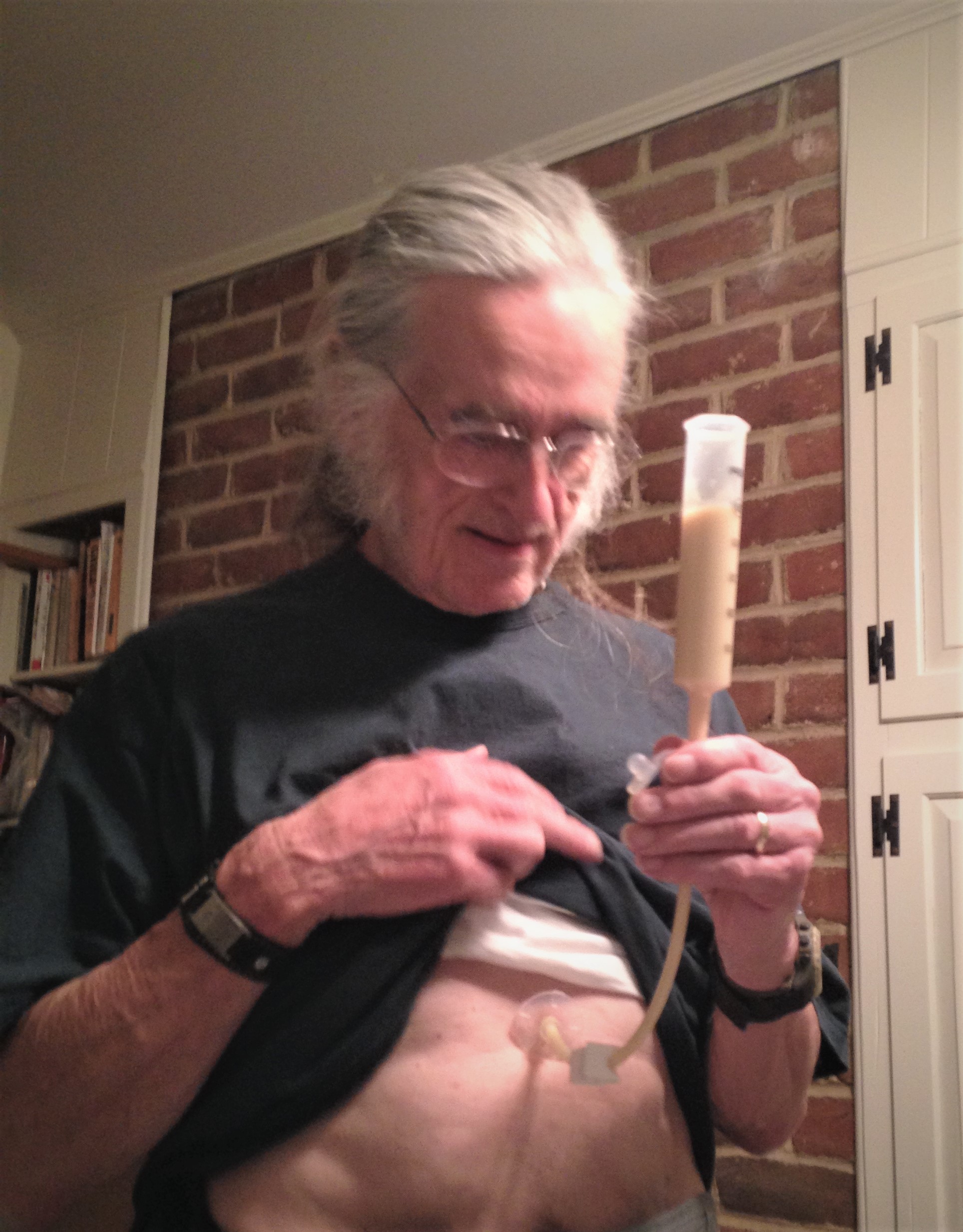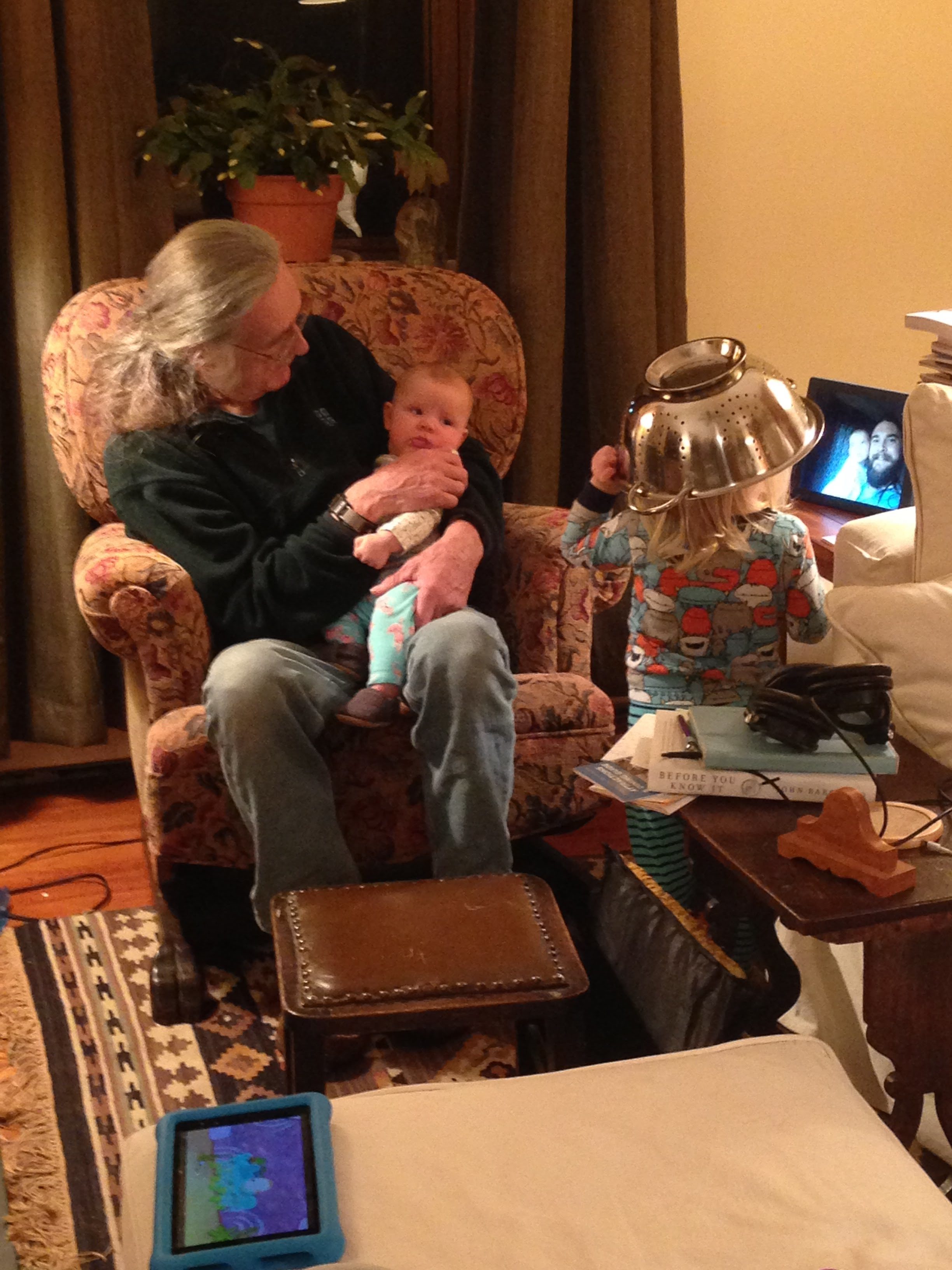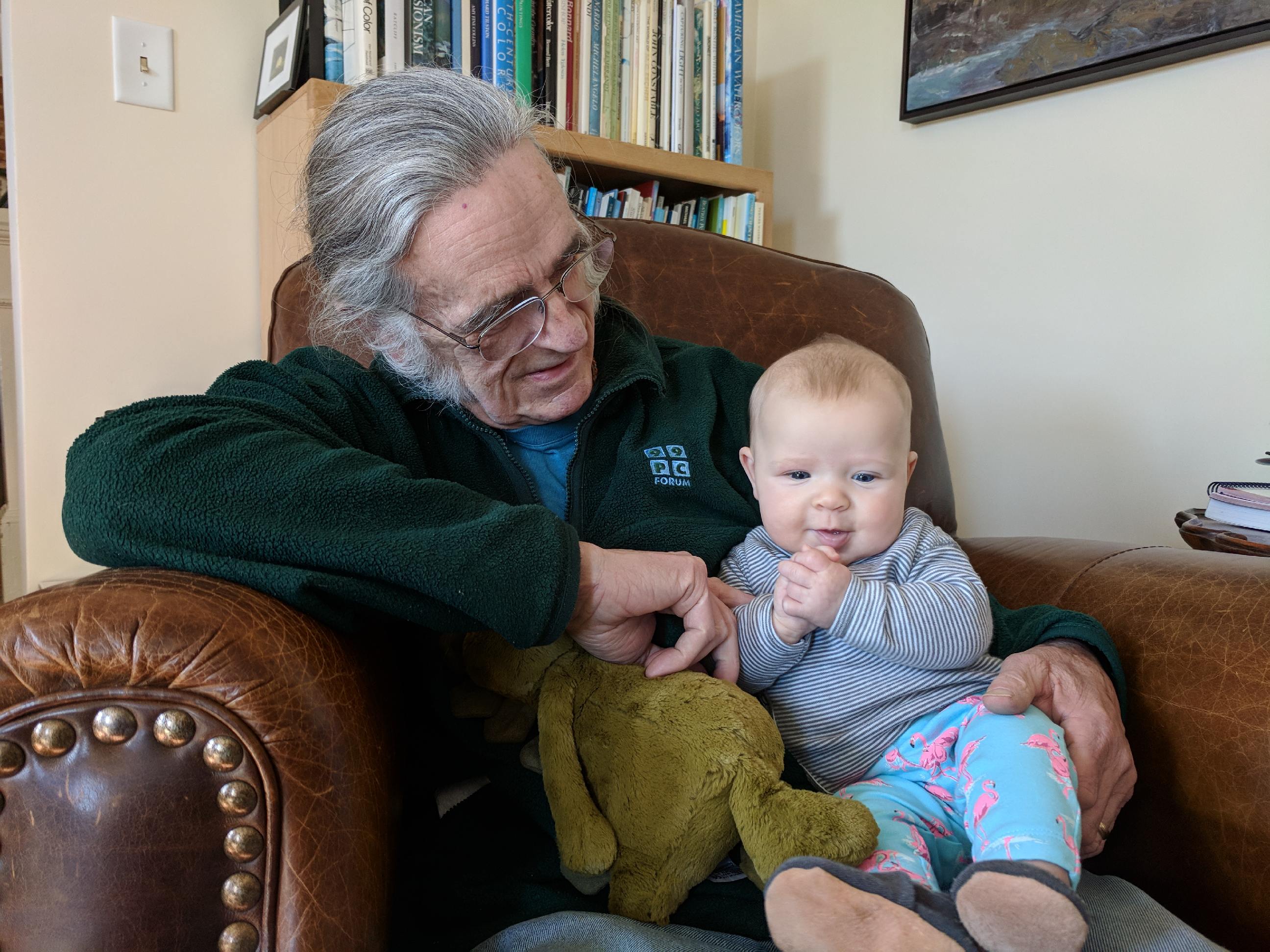My neurologist says I have one thing wrong, my motor neurons are dying, for which there’s no cure. My primary care doctor says I am healthy apart from the impact ALS is having on my face and throat. My Tibetan doctor’s observations, however, and her consultations with a Tibetan specialist in neuro-degenerative diseases say my condition is complex but may be curable. Here’s an overview of the theory and practice of Tibetan medicine along with some detail about its diagnosis and treatment of my condition.
Tibetan medicine is based on theories and practices derived from what developed into the major medical systems in India, Persia, Greece, and China, as well as ancient Tibet itself. The primary diagnostic tools are highly sophisticated forms of perceptual skills that recognize physiological data through sensory means. One of its most developed diagnostics tools is pulse analysis. Inspection of urine and the tongue are also important. Treatments include medicines primarily made from herbs and minerals, physical therapies like moxabustion (a form of heat therapy), massage, needle therapies (similar to acupuncture), and changes to behavior and diet.
The fundamental theory is that disease originates from wrong levels of nyepa, three bodily energies named rLung, tripa, and béken, each of which has five subcategories with specific locations and functions. Disease results when these energies are disrupted by unhealthy diet, activity and/or environmental triggers. The specifics of an illness vary with each patient’s background.
The theory seems unscientific to those of us who learn about human biology in the West but some recent research has shown correlations between the nyepa metaphor and modern genomics. The symptoms classified under nyepa are in any case real enough so it’s best to think of them as diagnostic categories with related metabolic profiles and systemic similarities.
Each of the nyepa is a potential cause of illness. It is often said that disease results when the nyepa are out of balance but it’s more that each of them needs to be in its proper biochemical pathway, function, and degree of activity than that they need to be balanced relative to each other. The three mental poisons—desire, aversion, and delusion—are the root causes that manifest the three nyepa. Imbalances in them show symptom presentations that relate to these three emotions. Everything that appears originates in the mind.
rLung, (pronounced loong) drives all motility in the body (the ability of organisms and fluid to move), including all neural signals and muscular impulses. It powers the circulation of our blood, respiration, our nervous system’s activity, sensory clarity, memory, the thoughts in our minds, and food through our digestive tract. Defective rLung manifests from the poison of attachment/desire.
mKhris-pa, (tripa) regulates body heat, metabolism, liver function, blood generation, skin function and integrity, vision, courage, will, and intellectual acuity. Defective tripa manifests from aversion/anger.
Bad-kan, (béken) maintains our physical structure; provides cohesion and adhesion in the body in terms of physical bulk, body oils and fluids; and facilitates joint health, sleep, and mental stability. It creates a sense of satiation, contentment, and tolerance and allows us to have a stable mind. Defective beken manifests from delusion/ignorance/indifference.
Tibetan doctors begin their diagnosis by asking the patient about their medical history and relevant parts of their personal history. They then examine the color, odor, sedimentation, scum, vapor, and, after vigorous stirring, the size, color, amount, and persistence of bubbles and any deposits in a urine sample. Next the doctor feels twelve distinct pulses at the radial artery of each wrist for the width, depth, strength, speed and quality of the pulse. The color, shape, texture, moisture content, cracks, and coatings of the tongue are examined along with characteristics of the eye, such as the sclera (the white outer layer of the eyeball), to further confirm the diagnosis. The doctor may also look for sensitivity at certain pressure points on the body. The doctor’s own body is the diagnostic instrument.
Treatment includes behavioral and lifestyle modifications such as meditation which I was already doing, dietary changes, herbal medicines and in some cases moxabustion heat treatment, acupuncture-like needling and/or other physical methods. Treating ALS and other neuro-degenerative diseases primarily with precious pills is one of the methods used extensively by Amchi Lobsang Dhondup, due to years of observing patient response.
There are several kinds of precious pills. The one prescribed for me is Rinchen Ratna Samphel, a compound of 70 ingredients that is indicated for, among other maladies, facial palsy and speech impediment.
I take a Ratna Samphel pill once every 3 days to support proper development and function of rlüng pathways, particularly upward-ascending rlüng. It cleanses the blood, rebuilds bodily constituents from cellular level to tissue level, consolidates and expels excess heat from improper blood formation, relieves tension in the upper body and re-establishes the functioning of rlüng, gut and blood together. It releases toxins, rebuilds healthy white blood cells, facilitates proper neuromuscular signaling, decreases inflammation and infection and supports immune strength. It also supports mental stability, stress management and sleep quality.
Mine is a rlung–béken compounded condition. My high calorie diet is required because my body has a decreased capacity to eliminate toxins/pathogens. rLung re-balancing requires nutritious, dense foods rich in high quality oils, and my deteriorated béken functions require foods that are easy to digest and that restore the digestive fire which breaks down what I ingest, assimilating what is useful and eliminating the rest. Persistent bubbles and foam in my urine indicate that my overall béken level is too high. That my rlung and bekan are disrupted indicates that my condition is associated with the poisons of attachment and indifference but not hatred, which has long been my own diagnosis.
Because Tibetan medicine explains things differently from Western medicine, here is a more detailed diagnosis of my condition. It includes:
-
Upward-ascending rLüng disruption which impacts movement at the throat, larynx, pharynx and upper esophageal region, the tongue and nose. This can be triggered by acute incident, traumatic event, or coordinated conditions. In my case it was allergic reaction to the brown tail moths.
-
Béken proliferation that hampers digestion and metabolic processes.
-
rLüng disruption that affects neural signal trajectories and function.
-
Deficient liver-gallbladder synchronization with the gut which inhibits fat metabolism and overheats the liver and gallbladder.
-
Kidney imbalance resulting in the disruption of all intra- and extracellular fluids, interstitial fluids, serum, lymph, and cerebral spinal fluid, and the related metabolisms and processes between fluid spaces in the body. This indicates immune compromise, and other disruptions in cellular signaling, lymph cycling, and filtration processes.
-
My gut’s ability to separate the nutritional essence, dangma, from the waste products, nyikma, at all cellular levels is reduced and is not well supported by my liver and gallbladder. That disrupts my metabolism, impacts regeneration of all my bodily constituents, and causes excess heat and friction at the tissue and joint level.
rLüng needs warming, nourishing foods to eliminate inflammation that wears on the immune system pathways and decreases function throughout body tissues and organs. Proper metabolism is necessary within the joints and tissues and related organ activity, lymph cycling, waste elimination and so forth.
When I was eating by mouth, I increased my intake of fresh foods and cut way back on coffee and the spicy, sour and salty tastes I love. Now I take food via a tube directly into my stomach, I’m consuming 2,000 calories worth of soy-casein formula daily plus 500-600 ccs of a pureed mix of organic green (e.g., collard greens), colored (e.g., beets) and sulfur-family (e.g., mushrooms) veggies. The veggie part of that diet is a combination of Tibetan medicine recommendations and the Wahls Protocol.
I also recently began taking an Oxaloacetic acid tablet daily because a researcher colleague of my Tibetan doctor considers it may help. I expect I’ll need to increase my current total of around 2,500 calories on which I’m maintaining a weight of 140 lbs as my strength returns and I can do more physical work again. My doctor will also recommend that I gradually replace more of the soy-casein formula with foods better suited to healing my condition.
I currently exercise in a way that is not aggressive or exhausting. Our gut needs the support of exercise to stoke digestive heat, promote metabolic fire throughout the body, and get the lymph system better at identifying nutritional essence versus waste. Intense activity would aggravate the rlüng and heat pathways within my body. My current program is 40 minutes of work on a cross-trainer, 350+ calories worth, on days when I don’t take a precious pill. My chief goal is to regain lung capacity that I didn’t realize I’d lost over winter. I’ll keep building the intensity of that program slowly as my legs regain strength. I also need solid rest to help align and calm the rlüng. I sleep 9 hours a night on average.
Nourishing environments are also important, which means I now avoid harsh winds and moist or cool areas that would worsen my kidney heat deficiency, and harsh sound environments that are harmful for rlüng. I will enjoy warming sunlight as soon as it returns but not overexpose myself to its heat. I balance my time between people that feed my spirit (face to face and online) and being in solitude.
The pre-conditioning defects in my body’s energy systems that were triggered into ALS by a severe allergic reaction almost two years ago had presumably taken a long time to develop and the disease itself has since done serious damage. It would be unrealistic to hope for a quick recovery and Tibetan medicine is not expected to restore health quickly in any case.
Amchi Lobsang Dhondup has achieved persuasive results with Multiple Sclerosis patients but he has been treating ALS patients for less time and ALS is different, a nervous system disorder not an autoimmune disease. He has a shorter history of success with ALS but it’s enough to be encouraging. My facial, mouth and throat muscles have continued to weaken slowly since I began his treatment almost eight months ago but I have not yet experienced the twitching in other muscles that is the first symptom of motor neurons dying. Since I’m able to rebuild my strength with exercise, I believe I lost it over the winter not because of ALS but because I got almost no exercise then and I was not able to eat enough.
My treatment program may be slowing the progression of ALS and it’s possible my body is slowly curing itself. There’s no way to know. What I do know is I am blessed to be alive now and I will continue to report with equanimity whatever happens in the future.




